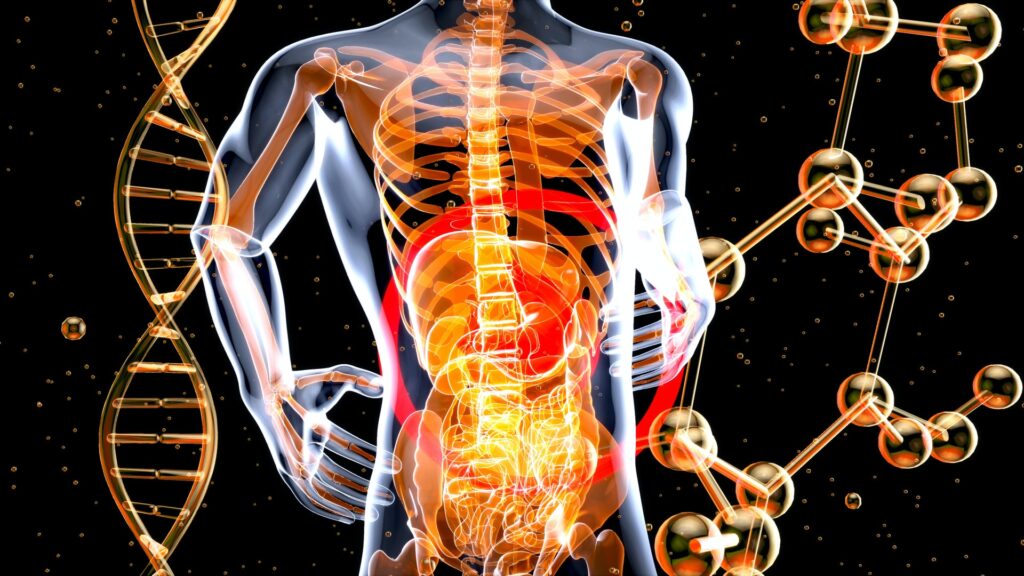Gastrointestinal problems
Many conditions might affect the stomach and intestines, which impact our health, general wellbeing and functionality in daily life. They range from mild food intolerance, through allergies to serious diseases and can impact our lives on many planes, thus making it harder to function in daily life optimally. These conditions could include conditions such as constipation, IBS (irritable bowel syndrome), nausea, bloating, diarrhoea and many more. According to Cleveland Clinic(1) they can be caused or worsened by a low fibre diet, not enough physical activity, changes in daily routine, too much dairy in the diet, stress, pregnancy or taking certain medications that influence bowel movements, e.g. anti-diarrhoeal medications, which in turn, can weaken the bowel muscle movements. Such conditions can also cause symptoms including (but not limited to) abdominal pain and gas, bloating, excess gas, alternating constipation, diarrhoea and many more(1). Various conditions cause various symptoms. Depending on the condition the patient is suffering from a range of symptoms and their intensity is going to be different. Examples of conditions and the symptoms they cause are(2):
- Celiac disease is an autoimmune disorder, where the small intestine is hypersensitive to gluten. Consumption of gluten causes the immune system to attack o small intestine, which further leads to damage. It causes symptoms such as diarrhoea or constipation, bloating, rashes, weight loss and poor growth in children.
- Constipation is defined as difficulty or infrequency in passing stools. It can be caused by lack of fibre in the diet, dehydration, stress, pregnancy, inactivity or taking certain medications (e.g. antidepressants, iron supplements or opioids).
- Crohn’s disease is a chronic bowel disease causing patches of inflammation in the gastrointestinal tract. The exact causes are still unknown, but it appears to be more common in western countries. Symptoms include long-lasting diarrhoea, abdominal pain and weight loss. It’s also linked to the presence of blood and mucus in the faeces.
- Diarrhoea causes frequent, loose and watery stools. It is usually accompanied by an urgent need to go to the toilet. It might be caused by bacteria (e.g. Salmonella or Campylobacter infection) or certain medical conditions such as Celiac or Crohn’s disease.
- Diverticular disease is a chronic disease, where diverticula occur in the bowel. They can further become infected (when undigested foods are trapped within them) and cause pain, constipation, fever, nausea or cramping.
- Irritable Bowel Syndrome or IBS in short is a common condition that causes long-lasting stomach cramps, bloating and diarrhoea. The exact causes of it remain unknown(3).
Gut health
This list is not exclusive and is far from complete. It only intends to outline a couple of various gastrointestinal conditions that affect the population. Nutritional therapy aims to prevent the occurrence of such diseases or manage the symptoms through specific, nutritional care. It aims to provide foods that have certain nutrients, and properties or exclude foods or types of foods from the diet to adapt to the condition and make functioning in activities of daily life easier. By implementing nutritional therapy one can expect the symptoms to decrease or even regress in some cases, which drastically affects the quality of life and general wellbeing. The therapist can use their knowledge to exclude, include or change the ratio of certain nutrients to manage gastrointestinal diseases. Such actions aim to reduce the symptoms of mentioned diseases, manage them and improve the quality of life of the patient.
References:
- Cleveland Clinic, Gastrointestinal Diseases, accessed on 13/05/21, available at: https://my.clevelandclinic.org/health/articles/7040-gastrointestinal-diseases
- Drugs.com, Gastrointestinal Disorders, accessed on 13/05/21, available at: https://www.drugs.com/article/gastrointestinal-disorders.html
- NHS, What is IBS? accessed on 13/05/21, available at: https://www.nhs.uk/conditions/irritable-bowel-syndrome-ibs




